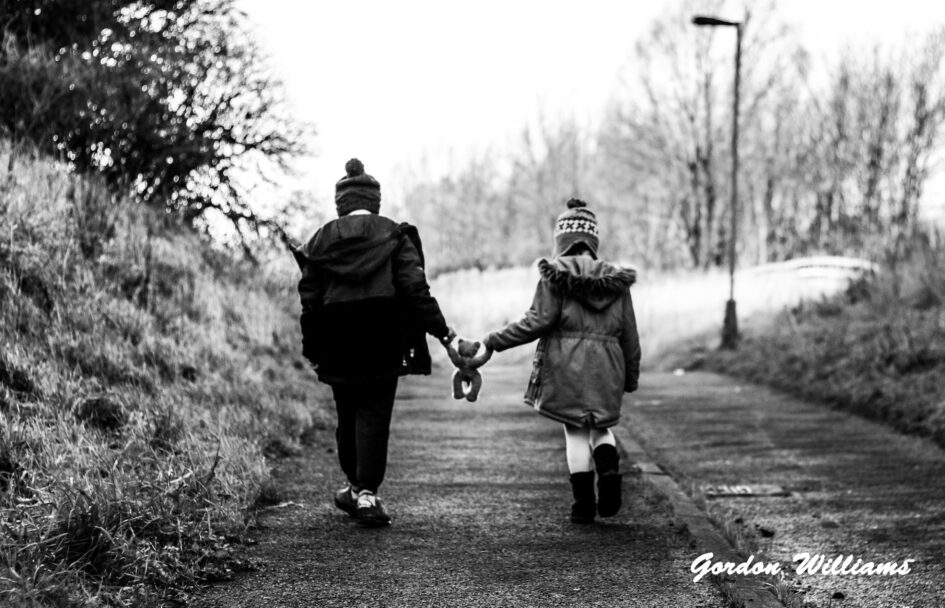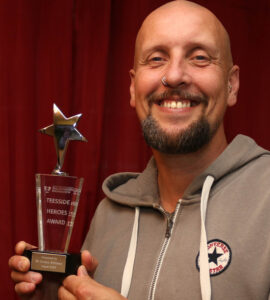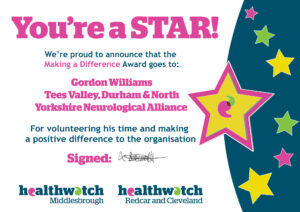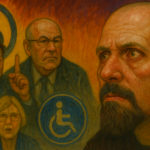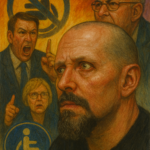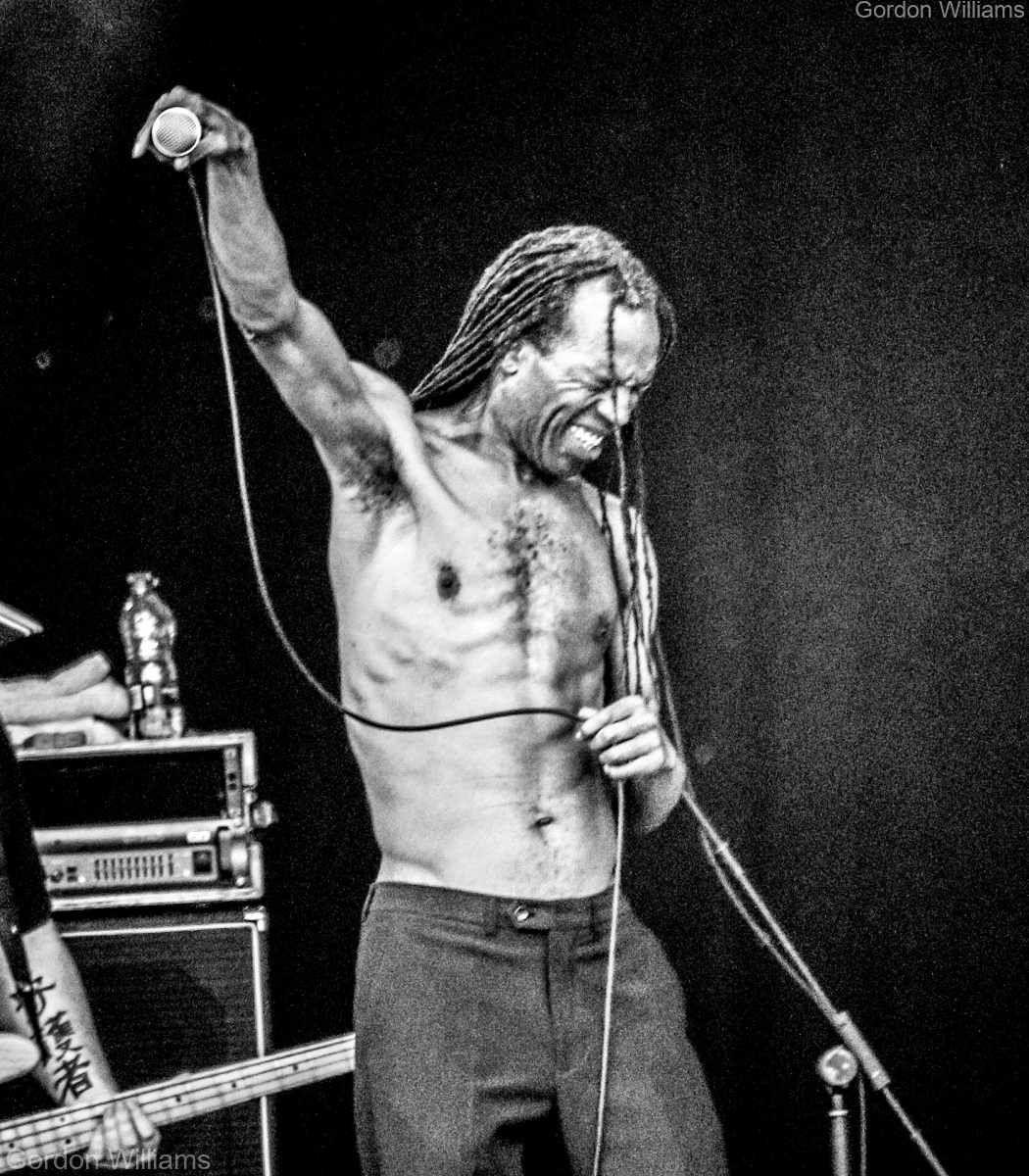I was asked to write a brief narrative of my life in the context of my neurological disorders and mental health to be used as a part of an educational book.
I needed to fit in everything from the abuse and discrimination i experienced to the support and understanding I recieved.
Also I wanted to show my succeses and achievements as well as my downfalls and failures to.
It was important for me to show how many years it took me to realise I was living with Tourette Syndrome, then finally getting diagnosed with not Tourette’s but ADHD, Autism and PTSD then realising they were pulling more strings in my life than I could have imagined.
‘Learning how to take some control of my life, body and mind has been my one of my greatest achievements so far’
The journey begins
Everything I have experienced in life so far has made me who I am today. It has shaped my neurological disorders and created some mental health issues. Being diagnosed late in life left me trying to understand and cope with these strange behaviours alone.
In my mid 20’s, I saw a talk show about Tourette’s. I recognised many of my tics but instantly went into denial and felt ashamed of my weakness. I look back now and remember that on the outside, I was this confident strong person, in control with a smile on my face yet, on the inside I was like the picture of The Scream by Edvard Munch.
In my mid 30’s I was beginning to struggle which was impacting on the people around me. After many faltering attempts, I spoke to my GP and asked for help and this was the beginning of my journey, from suffering to living.
To complete this journey, I had a lot to learn about myself and the impact I have on the world around me. Living with Tourette’s syndrome, ADHD, ASD and PTSD is no easy task and they sometimes work together to create something unique but, they also fight for control of my mind.
Journey through Childhood and Education
Growing up in the 70’s and 80’s, my conditions were not really heard of and children like me were often accused of being naughty, defiant, criminal, idiotic, strange, bullying and called names by the teachers such as ‘class clown’, ‘village idiot’, ‘mindless fool’. I could create an awfully long list of the names and titles I have been given over the years. For the first ten years I was fighting a battle on two fronts.
At home I had a very violent and abusive father. My conditions brought more attention on me than my siblings so I had to learn very quickly to mask, suppress and hide these strange noises and outbursts the best I could, I was not always successful.
At school, teachers took an immediate dislike to me, I could not stop shouting out in class, I found it difficult to sit still, I was distracted by other pupils around me and struggled to sit near them. Teachers could not understand why I could excel one minute and struggle the next and some days I did not engage at all.
No matter how many times I was punished for breaking rules it was not long before I forgot about the punishments and broke the same rules again and again. These two battles started me on the road of suppression, masking and hiding my conditions and started my life of exclusion. At school, I was often put in isolation and when I was allowed in the classroom, I had to sit alone in the corner facing away from the other pupils.
At home, I spent a lot of time alone in my room and after a beating I would spend a lot of time in bed waiting to see if the second or third beating was going to come. I was belted, punched and kicked so many times that I built up an almost superhuman tolerance to violence and pain.
As well as the physical abuse, my father was a master of mental cruelty and control and this had its own long-lasting issues that would leave me vulnerable in close relationships for many years to come. I spent a lot of time curled up with my dog in her wicker basket, there seemed to be something safe and comforting there. Regular beatings and abuse at home, hatred from teachers, isolation, name calling and constant punishments at school eventually became normality while all the time living with ADHD and suppressing tics left me feeling like a freak.
Around my 10th birthday my father left and took the danger and fear with him. My home was now a safe place to live and my tics hit the roof. I was very ashamed and embarrassed about these tics and the one place they could not happen was in school, I could not face any more bullying from teachers and pupils.
Secondary school was far worse than primary, the hatred I received from some of the teachers was on another level and this made life hell.
The isolation and punishments became worse. I spent more time stood in the corridors than I did in the classrooms. School trips I had to stand with teachers while others ran free, I was banned from school discos and other events arranged at the school.
There was an incident when a teacher assaulted me because of my eye tics, which she misunderstood.
As I passed the school that night something snapped and I smashed a window in anger, the stress relief I got from this pushed me to smash many more. I admitted what I had done the next day and surprisingly, the Deputy Head seemed to understand.
Not all teachers were bad to me. My French teacher was amazing, he was wacky and zany, very energetic but also took no messing about in his class. The best thing about him was he did not have any favourites but also did not dislike anyone either, even if you were like me.
This teacher took my French mock exams from below 50% up to around 90%. I finally escaped school in 1989 with 7 GCSE’s, not bad considering my last year was spent bunking off most days to play pool in the morning then going to school for dinner and some afternoon lessons.
My school experience inspired me to write Diary of a Neurodiverse Schoolboy
Journey through Adulthood and work
I joined the army right from school and went into the Junior Leaders Infantry. I always wanted to be a soldier and that is all I planned for. At first things went well then, the tics became an issue along with my short attention span. I also got into a few fights and found myself outside the guard house most days waiting for a blasting by the regimental police. I had swapped teachers and corridors for the Regimental Police and the guard house.
There was something else affecting me during this time, now know it was PTSD. My father was in the forces when I was born and looking back, I can see how the smell of boot polish and the uniforms among other things were strong triggers.
I was living in a world full of triggers and they brought my career to an end in a matter of months.
Some traits of my conditions would lead me down a very rocky path, lack of fear, disregard for danger and inability to keep to the rules which slowly disappear overtime, these traits would be seen as natural talents to some unscrupulous people.
Although I managed to stay in some form of employment, I also made extra money using my ‘natural talents’ and it was not long before I was working the doors and doing security which led to evictions and debt collecting, not in the legal way more like something you see in a Tarantino movie, my associates were like characters from the movies.
It would not be unusual for me to be woken in the early hours to either be at a major deal or in a property removing multiple people with force. In my mind the people on the other end of my activity were criminals and had chosen to be involved in this dangerous world.
Being threatened with knives, machetes and guns became normal and I thrived on it, I needed the adrenalin. I look back now and see how I was used. It is not difficult to coerce someone who is looking to fit in and is eager to please especially when they have specific learning disabilities.
Journey through Relationships
I was married at 18 and spent 14 years in an abusive relationship where I suffered physical and mental abuse. Halfway through my marriage I turned my life around, moved away from the criminal fraternity.
I began my new life working with people like myself and found I could communicate with people with ADHD, autism and other disabilities, I still had no diagnosis but had realised the tics were down to Tourette’s syndrome, but I was still in denial masking, suppressing and hiding my disorders.
My marriage ended badly and in true fashion, my wife, the abuser blamed me the victim and I found myself in court accused of being the abuser. I was judged on being a large male who could not possibly have been a victim of a slim lady, so I must be the abuser.
Eventually I received an apology from the police over the phone when, for some reason, my ex-wife admitted to lying. My second marriage turned my life around. I had met someone I could trust and talk to. I was still trying to hide my conditions though.
Hiding the conditions took a toll on our relationship and I eventually opened up to my wife after finally talking to my GP and we began to work on things with more understanding of each other.
Many people have come and gone in my life, some left because they just didn’t get the madness that surrounds me and others I cut out because they had a negative impact on me.
For those that have stayed I have great respect and love for.
Diagnosis Journey
After my diagnosis of Tourette’s from a neurologist I was left to find my own specialist, after two neuropsychiatrists, I found my messiah.
From my first appointment, her understanding and manner was amazing, the doctor patient relationship meant the world to me. If I got no answer to my problems, at least got understanding and that was worth its weight in gold.
Sadly, she moved on and my life took a dive without her support. I eventually found another specialist who is remarkably similar so on that front for now things are good although I would prefer more than 30 minutes a year of support.
During my diagnosis journey which started in my mid 30’s I have been referred to mental health services many times and sadly been refused help and support each time.
Apparently, I just do not fit in or they do not have a department relevant for me. Although my diagnosis improved relationships and understanding with friends and family it did not have the same impact at work, within 6 months I found myself unemployed and the treatment I received from my employer left me unemployable and at an all-time low.
Finding support from others was helpful but it was also a minefield of bullying and jealousy with circling narcissistic predators. Eventually, I found a charity where I fitted in and after some time became a trustee. Not only am I an ambassador but offer peer support work voluntarily which allows me to manage my time, so I do not overload myself.
Being involved in my community in some way raises my spirits, gives me self-esteem and a feeling of purpose.
By this time, I had my diagnosis of ADHD and sensory processing disorder which were very obvious. A few years later would come my high functioning autism diagnosis, which was much more noticeable to others than me. I found a support group where I fitted perfectly, I describe this moment as finding my lost tribe.
I have learned many techniques to live with my conditions and I am working to undo the extreme suppressing and masking that cause a lot of anxiety and stress. I talk to students at a local University in the School of Health Department to help educate our future professionals.
Day to day for me now is carefully planned around my many triggers and issues. I need strict routines and spend a lot of time waiting for my brain to decide to work. Journeys are planned around toilets for IBS and transport must be safe for my tics and intrusive thoughts, which can be particularly hazardous. I have carried out dangerous obsessions on many occasions and came to harm and near death many times.
I honestly believe if I die before my time it will down to an obsessive action.
In the home my wife has hidden or removed many dangerous objects that I obsess about. All electrical items with motors are standing on foam to reduce noise for my sensory issues.
My wife as my carer, has many techniques to help me cope with change, avoid danger and find things that are either right in front of me or I have put in a very strange place. In social settings, my family have become experienced in explaining that I am not being offensive, it’s either a tic or just the logical, blank unemotional way I communicate. My coping strategies seem to be mainly creative.
My photography helps me focus while out and about and gives me a methodical process, pictures to edit at home, music playing, listening is a great mood enhancer although I must be careful because some music can raise my hyperactivity and the elation can bring on powerful tics and this can be disastrous in a public place.
The gym is probably the most essential coping strategy and since the day I walked into a gym at 14 years old I have not missed many weeks in 34 years.
As well as the neurological and mental health issues I live with daily, there are a few physical issues as well. Being so heavily focused on my mental and neurological disorders, I often dismiss or put aside any physical issues that come along. In recent years this has come back to bite me.
The anxiety and stress caused by my conditions have had a profound effect on my cardiac health. Looking back, the way I dealt with my prolapse disc was not ideal and treated it on the same level as a broken fingernail until it literally stopped me in my tracks.
Because of my childhood, I have always just accepted pain as something you get used to in time. The way I process it is, there is so much infighting between my neurological and mental health disorders there is little time and headspace left to attend to physical conditions that come long.
The associated pain from tics are different altogether because a physical tic can cause pain and the pain sets off the tic more, this then spirals out of control. Eye tics can become so frequent that I cannot see, and the pain is excruciating, neck tics have damaged the vertebrae in my neck and cause a lot of pain in the muscles.
Having an above average, high pain threshold has advantages but also means you are not treated for the correct level of pain.
With physical conditions, I will tell my specialist once and then not mention it again, this gives a false impression that the issue has gone when in fact it is still there or maybe worse. I think this was ingrained in me as a child not to complain or moan about such things.
Even with all the understanding and knowledge my family and friends have, they still get annoyed and upset with me on occasions and I still get accused of hiding behind my conditions or using them as an excuse. It can be quite lonely when you are the only one like yourself, I have often found myself surrounded by family and friends but feeling quite alone.
It would be impossible to write down everything I live with and the things I have learned without writing a book, so I have done the next best thing to reflect and make sense of my life and published a webpage with insight, occurrences and the diary from my school days to maybe help others make sense of their world.
Where am I now?
I have an amazing Wife, 8 brilliant children, 7 Grandchildren and counting.
I have lots of support within my family, friends and the charity as well as some awesome friends dotted around the UK.
I became a trustee for Neurokey (TVDNY) as well as a support worker, advocate, neurodiverse ambassador and a lived experience ambassador for the charity who have had an incredibly positive impact on my life. The work with Neurokey took on a journey into education and now I am an expert by experience at two Universities where I where I am involved with Psychology, Occupational therapy, Nursing and any other department that asks for my input.
I recently became a Neurodiversity Community Ambassador for Tees Valley Buddies.
Although I only receive one 30-minute appointment a year for my conditions, the Neurologist I see has a great understanding and the relationship means the world to me.
Engaging with the Truth Project was a massive step forward dealing with a part of my life I had been keeping locked away.
I became a member of the Armed Forces Bikers Charity who are like a second family with no judgments and lots of understanding and support if needed.
Not only do I look at the impact the world has on me but the impact I have on the world around me.
Recently I have started online studies and already completed many University run courses in ADHD, Autism, PTSD, Psychological first aid, Trauma, Anxiety And depression and have many more lined up.
I have a thirst for knowledge about myself and others with disabilities as well as neurotypicals.
